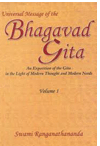| Spiritual Meditations | |
| 26 Nov 2010, NewAgeIslam.Com |
| Bhagavad Gita: Yoga manual | ||
As the story goes, Pandu has five sons, three from his wife Kunti -- representing the power of dispassion-- and two from Madri, the power of persisting in dispassion. The five brothers unwittingly lose their kingdom in a game of dice, deceitfully loaded by Duryodhana (material desire) against them. The bodily kingdom comes to be ruled by the blind king Dhritarashtra who represents our own sense-infatuated and hence "blind" mind. -- Anand M Kulkarni | ||
| Bhagavad Gita: Yoga manual | |
By Anand M Kulkarni Does the Bhagavad Gita contain anything that defines its purpose? It does. Not once or twice, but its purpose is unequivocally asserted at the end of each chapter, that is, eighteen times! For example, at the end of Chapter II, it is stated that this chapter is in fact an exposition of an aspect of yoga known as Sankhya Yoga. All chapters deal with one aspect or the other of yoga. One may ask, why yoga was being explained in the middle of a purported battle to be waged between two clans, the Kurus and the Pandavas. As Paramhamsa Yogananda says, the Bhagavad Gita is evidently a spiritual metaphor used for the exposition of yoga. Persons portrayed are in fact ingenious depictions symbolising the various stages in the devolvement of spirit into matter. The battle proper, represents the real struggle that ensues within a person who realizes that all along it was the mind and its deep-rooted tendencies that was playing a devious game of deception with him, leading to false perceptions of truth and happiness and so, under proper guidance, sets out to rectify all this. Kurukshetra, the battlefield refers to our own bodily domain, where the action must take place. Kuru in Sanskrit, is derived from the root "kri" meaning action and kshetra means domain. Pandu was the rightful and noble monarch of Bharata, the bodily kingdom. Pand in Sanskrit means white or pure, referring to the faculty of discriminating between right and wrong, which humans inherently possess. If man lives as per this discriminating power he will live life in such a way that slowly but surely, the soul's body-consciousness ascends to spirit-consciousness and thus one attains independence from false providers of happiness, namely, the five senses. As the story goes, Pandu has five sons, three from his wife Kunti -- representing the power of dispassion-- and two from Madri, the power of persisting in dispassion. The five brothers unwittingly lose their kingdom in a game of dice, deceitfully loaded by Duryodhana (material desire) against them. The bodily kingdom comes to be ruled by the blind king Dhritarashtra who represents our own sense-infatuated and hence "blind" mind. The blind king's eldest son Duryodhana represents vain, material desire, most difficult to fight off (Duh means difficult and yodhana means to fight). His ninety nine other sons represent other sense-entrenched tendencies of the mind. However, as portrayed in the story, since the five Pandu sons are born of rightful discrimination and dispassion, they together possess qualities needed to recover this lost kingdom. The youngest, Sahadeva represents the discriminating knowledge which says, "I have to resist that". Nakula represents the knowledge which says, "I have to adhere to that". Arjuna is the knowledge which asserts, "I must have self-control". Bhima, the knowledge that asserts, "I am strong", and Yudhisthira, the knowledge that asserts, "I am calm even in war." These are qualities necessary for the ascent of consciousness from mere body-consciousness to immortal soul-consciousness. However, knowledge without the kinetic power cannot produce any movement. Hence enter Draupadi who "belongs" to all the five brothers as wife. Draupadi represents the otherwise dormant divine life force known as Kundalini Shakti which when awakened, unites with various aspects of discriminatory intelligence within us all. In kundalini oriented meditation, this "living electricity" rapidly traverses the storehouse of karma results in their internal cauterization by precipitating appropriate yoga-kriyas which would be physical, mental or even emotional in nature. This represents self-purification and consequently, in day-to-day working life too, one starts taking right action, all this eventually leading to total realization of Self. Follow us on Twitter for more stories Source: Times of India URL: http://www.newageislam.com/NewAgeIslamIslamSpiritualMeditations_1.aspx?ArticleID=3733 |





 Moderate Islamist here
Moderate Islamist here


0 comments:
Post a Comment